How to Get a Medical Marijuana Card in CA: A Complete Step-by-Step Guide
by Maya Green · April 8, 2025
Learn how to get a medical marijuana card in CA with our complete step-by-step guide.

Overview
Navigating the process of obtaining a medical marijuana card in California can feel overwhelming, especially when you’re seeking relief. This article serves as a compassionate guide, outlining the eligibility requirements, application process, and the many benefits of having your card. It’s important to remember that a written recommendation from a licensed physician is crucial, as it lays the foundation for your journey.
You may find comfort in knowing that the steps involved are straightforward. Start by gathering the necessary documents, and take the time to understand the legal considerations that come with your application. This clarity will empower you to access therapeutic marijuana safely and legally, ensuring that you can focus on what truly matters—your health and well-being.
As you move forward, remember that you are not alone in this process. Many have walked this path before you, and support is available. Embrace the opportunity to take control of your health, and know that each step you take brings you closer to the relief you seek. Together, we can ensure that your experience is as smooth and supportive as possible.
Introduction
In California, accessing medical marijuana is more than just a legal formality; it represents a vital pathway for countless patients seeking relief from debilitating conditions. The Medical Marijuana Identification Card (MMIC) serves as a key to unlock therapeutic benefits, making it essential for those grappling with chronic pain, anxiety, and other qualifying ailments to understand its significance.
As the landscape of medical cannabis evolves, so too does the wealth of resources available to patients. From telehealth consultations to patient advocacy groups, there are numerous avenues to explore. This article delves into the intricacies of obtaining an MMIC, exploring eligibility requirements, the application process, and the myriad benefits that come with legal access to medical cannabis.
Through real-world examples and expert insights, we highlight the transformative power of medical marijuana in enhancing the quality of life for patients across the state. It’s important to remember that you are not alone in this journey, and there are supportive resources available to guide you every step of the way.
Understanding Medical Marijuana Cards in California
In California, understanding how to obtain a medical marijuana card is a vital step for patients with qualifying health conditions seeking legal access to marijuana for therapeutic use. This card acts as formal proof that the holder has received a recommendation from a licensed physician, which is essential for navigating the process, allowing them to purchase marijuana from dispensaries without the legal complications that recreational users may encounter. The Medical Marijuana Identification Card (MMIC) not only opens the door to a wider variety of marijuana products but also offers significant legal protections for cardholders.
As of 2025, California has approximately 1.1 million active MMIC holders, reflecting the increasing acceptance and utilization of marijuana for medical purposes. This statistic underscores the growing reliance on marijuana as a treatment alternative for various health concerns, particularly chronic pain, anxiety, and cancer support.
The benefits of understanding how to obtain a medical marijuana card extend beyond mere legal access. Patients with this card frequently report an enhanced quality of life, as it allows them to explore a range of therapeutic marijuana products tailored to their specific needs. Healthcare professionals emphasize the importance of this understanding, noting that it not only legitimizes the use of marijuana for treatment but also ensures that individuals receive guidance on safe and effective consumption methods.
Real-world examples illustrate the positive impact of MMICs on people’s lives. For instance, those suffering from chronic pain have found significant relief through personalized marijuana therapies, which are more accessible with an MMIC. Additionally, the card provides individuals with peace of mind, knowing they are protected under California law when using marijuana for therapeutic purposes.
A 2025 study highlighted that veterans using therapeutic marijuana reported fewer symptoms of PTSD and required fewer prescription medications, showcasing the transformative effect of marijuana on mental well-being.
Recent trends reveal a decrease in cannabis permits issued from May to December 2023, followed by a rebound in January 2024, highlighting the ever-changing landscape of California’s therapeutic marijuana. Furthermore, a quote from New Frontier Data indicates that 29% of female consumers prefer non-flower products, while 15% of men share this preference, reflecting a shift in consumer choices that may influence those seeking relief from various ailments. This card not only provides legal access and a broader range of products but also offers essential protections and support for individuals navigating the complexities of therapeutic plant use.
Leafy DOC exemplifies this commitment by facilitating access to cannabis and improving the quality of life for patients, especially those dealing with chronic pain, anxiety, and PTSD, through its online platform for telehealth services and educational resources.
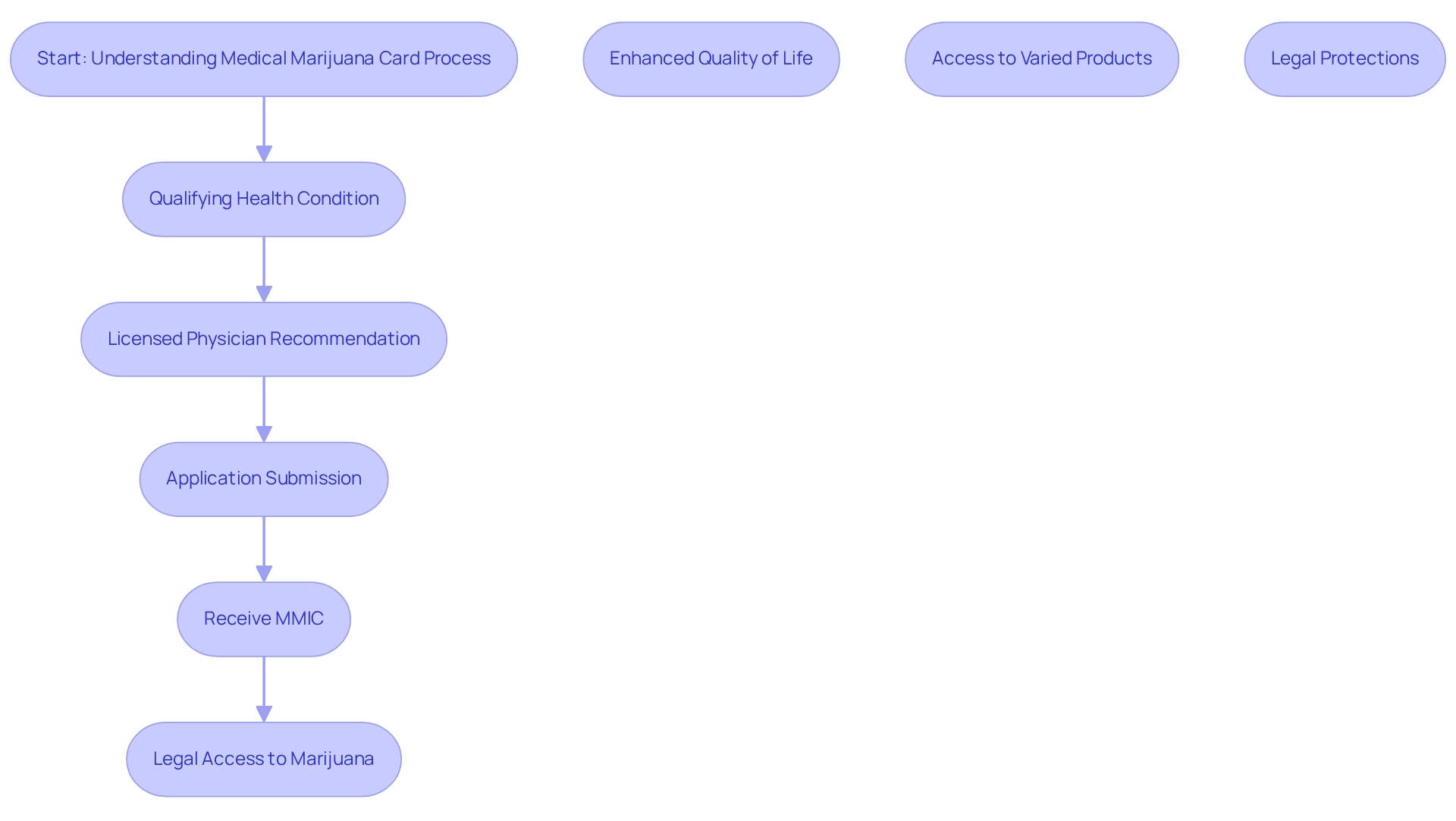
Eligibility Requirements for a Medical Marijuana Card
To navigate the process of obtaining a medical marijuana card in California, it’s essential for applicants to understand the specific eligibility criteria. First and foremost, being a resident of California and presenting a qualifying health condition is crucial. Common conditions include chronic pain, anxiety, PTSD, and other serious ailments recognized by state law, reflecting the struggles many individuals face.
Recent statistics reveal that approximately 62% of individuals suffering from chronic pain are seeking authorization for medicinal herb usage. This statistic underscores the growing acknowledgment of therapeutic marijuana as a viable treatment alternative. Furthermore, projections indicate that the marijuana market may reach $87.0 billion by 2035, highlighting the increasing acceptance and demand for therapeutic marijuana.
When applying, individuals must provide proof of identity and residency, typically through a government-issued ID along with a utility bill or lease agreement. A key step in obtaining a medical marijuana card is securing a written recommendation from a licensed physician. This recommendation should affirm that therapeutic herb is essential for the individual’s treatment, emphasizing the doctor’s role in guiding patients through the complexities of its therapeutic use.
After receiving the doctor’s certification, it’s important to understand that the registration process may vary by location. Once the state approves the registration, individuals will receive a downloadable ID card via email or by post, allowing them to access local dispensaries and purchase medicinal cannabis products. In 2025, revisions to California’s healthcare cannabis card eligibility criteria further clarified the process, ensuring that individuals with chronic pain and other debilitating ailments can access the care they need.
For instance, case studies have shown that individuals experiencing chronic pain have successfully acquired their marijuana cards, leading to improved quality of life and pain management. Many individuals report that therapeutic marijuana provides significant relief without the risks associated with conventional prescription medications, such as opioids.
Moreover, the variability in state regulations regarding marijuana delivery can greatly affect patient access. Recent research highlights these variations, and expert insights from physicians stress the importance of understanding eligibility requirements. Numerous physicians advocate for therapeutic marijuana as a means of managing chronic pain, suggesting it can offer considerable relief when traditional treatments fall short.
As President Volodymyr Zelenskiy wisely stated, “The legalization of marijuana is a tool that can be utilized to enhance mental well-being,” emphasizing the therapeutic benefits of medicinal marijuana, particularly for conditions like chronic pain and anxiety. As the landscape of therapeutic marijuana continues to evolve, staying informed about how to obtain a medical marijuana card in California—including eligibility requirements and qualifying conditions—is vital for those looking to navigate the application process effectively. Additionally, the direct delivery of therapeutic marijuana enhances access for individuals, especially those confined at home due to health issues, facilitating their ability to receive the care they deserve.
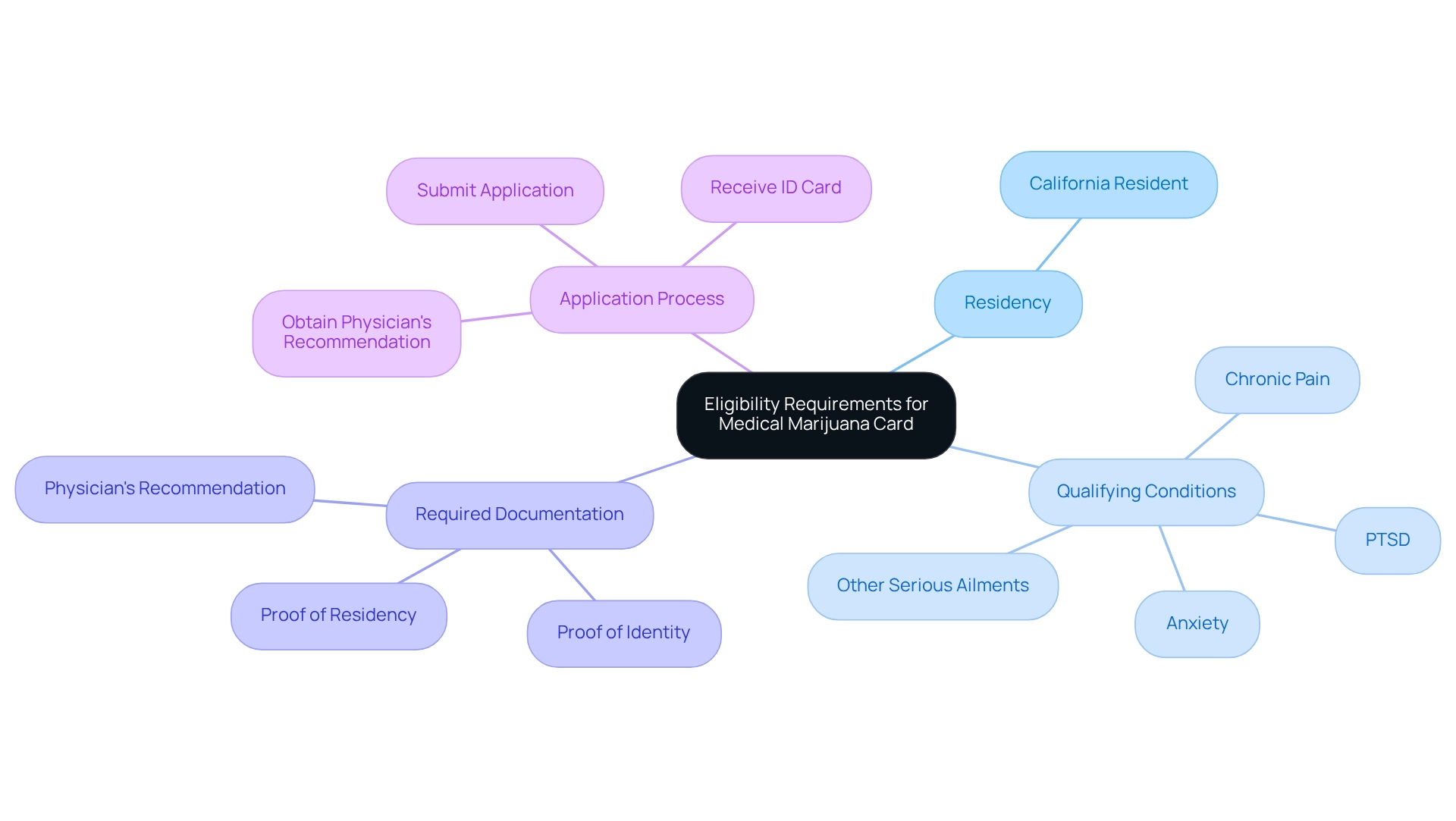
Step-by-Step Application Process for a Medical Marijuana Card
The application procedure for acquiring a cannabis card in California involves several important steps designed to ensure a smooth experience for patients like you:
-
Consult with a Licensed Physician: Start by scheduling an appointment with a physician who specializes in cannabis. Leafy DOC offers convenient telehealth services, allowing you to connect with a qualified doctor from the comfort of your home. Simply submit an intake form with your personal details and ID, and you can either book an on-demand telehealth appointment or schedule a time that works best for you. This approach emphasizes fast approvals and comprehensive support throughout the process, making it easier than ever to connect with licensed physicians.
-
Obtain a Written Endorsement: After your consultation, if the physician determines that therapeutic cannabis is suitable for your condition, they will provide a written endorsement. This document is essential for understanding how to get a medical marijuana card in California.
-
Complete the Application Form: Download the Medical Marijuana Identification Card Application/Renewal Form (CDPH 9042) from the California Department of Public Health website. It’s important to ensure that all sections are filled out accurately to avoid any delays.
-
Gather Required Documents: Collect the necessary documentation, which includes proof of identity (such as a California driver’s license) and proof of residency (like a utility bill). These documents are crucial for verifying your eligibility.
-
Submit Your Application: Send your completed application form, along with the required documents and a non-refundable application fee (typically $99, or $50 for Medi-Cal beneficiaries), to your local county health department. This step is vital for understanding how to get a medical marijuana card in California and for initiating the approval process.
-
Receive Your Card: Once your application is processed, you will receive your health cannabis card. This card allows you to legally purchase cannabis from licensed dispensaries throughout California.
-
Renewal Process: It’s important to note that individual cannabis certification renewals vary from state to state, typically occurring every one to three years based on your location. Leafy DOC can assist you with the renewal process to ensure you maintain access to your cannabis card.
In 2025, understanding how to get a medical marijuana card in California typically takes around 24-48 hours on average, thanks to streamlined processes and the increasing use of telehealth consultations. This efficiency is especially beneficial for individuals with chronic conditions who require timely access to cannabis. California’s historical context regarding cannabis legislation, starting with the legalization of therapeutic cannabis in 1996 through Proposition 215, underscores the evolving rights of individuals under current regulations.
As the landscape continues to change, staying informed about updates to the application process is essential for potential clients. Real-life experiences highlight the convenience of telehealth for cannabis consultations, with many patients sharing positive stories and swift access to necessary evaluations. For instance, while autism may not directly qualify for cannabis in California, if you are experiencing chronic pain due to your condition, you can obtain a cannabis card with the help of your appointed caregiver, as a minor.
This patient-centered approach, combined with professional support during the application process, positions Leafy DOC as a trustworthy resource for individuals seeking to understand how to get a medical marijuana card in California. Leafy DOC proudly serves a community of over 40,000 patients, reflecting its reliability and commitment to those in need.
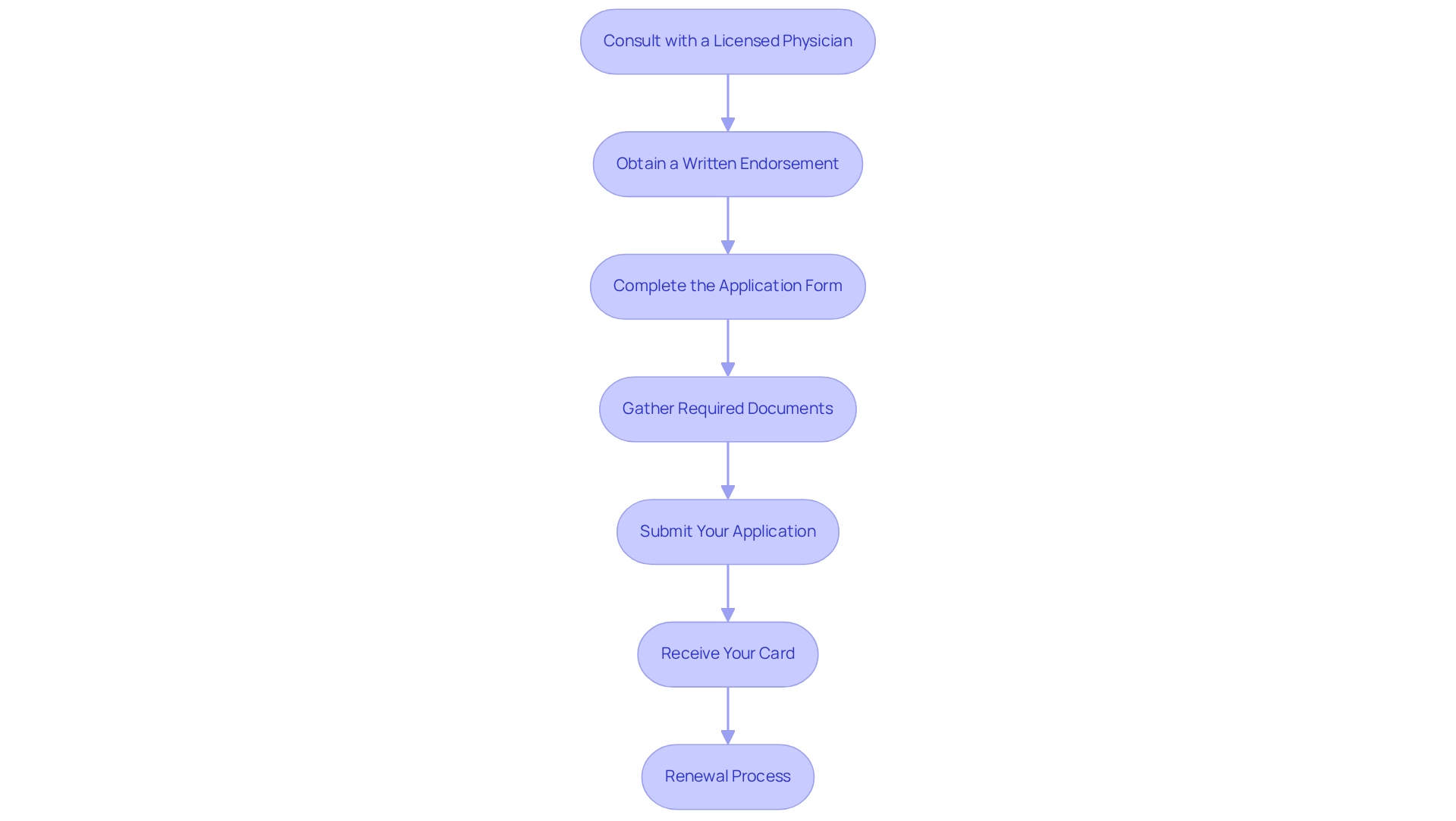
Frequently Asked Questions About Medical Marijuana Card Applications
Here are some frequently asked questions regarding the medical marijuana card application process:
-
How long does it take to receive my card?
Applications are typically processed within 24-48 hours. However, it’s important to remember that depending on the workload of the county, it may take longer. For instance, in West Virginia, cards are mailed out 30-45 days after submission, highlighting the variability in processing times across states. -
Can I apply online?
Yes, many counties in California offer online application options. This feature streamlines the submission of documents, allowing you to arrange consultations from the comfort of your home. You may find that a significant percentage of applications are now submitted online, reflecting a growing preference for digital solutions in healthcare services. -
What if my application is denied?
If your application is denied, you have the right to appeal the decision. You can submit an Appeals Form to the California Department of Public Health within 30 days of receiving the denial, ensuring that you have a voice in the process. -
Do I need to renew my card?
Yes, medical marijuana cards must be renewed annually. The renewal procedure reflects the original application process, ensuring that individuals retain their access to cannabis without disruption. Typically, renewals range from every one to three years depending on your state, and Leafy DOC is here to assist you through this process. -
What are common questions about the medical marijuana card application process?
Patients often inquire about the necessary documentation, the types of qualifying conditions, and the overall timeline for receiving their cards. Leafy DOC has effectively tackled these issues, simplifying the application process and improving accessibility for individuals, especially those in rural regions or with mobility difficulties. -
What do individuals say about their experiences with the application process?
Many patients have shared positive experiences regarding the efficiency and convenience of the online application process. For instance, Isabella C. noted, “The website was easy to use, and I scheduled my appointment in minutes. The doctor called me right on time, and I got my card approved without any hassle. Highly recommended!” -
What are examples of patients’ experiences with cannabis card application timelines?
Patients have reported varying timelines based on their county’s processing speed, with some receiving their cards within days while others may experience longer waits due to administrative backlogs. Leafy Doc’s commitment to fast approvals has significantly improved access for many individuals, as highlighted by Janet D., who expressed gratitude for the accessibility of services from home. -
What is the average processing time for cannabis card applications in California in 2025?
As of 2025, the average processing time remains around 24-48 hours, although this can fluctuate based on specific county workloads and the volume of applications received. -
What is the historical context of therapeutic marijuana in California?
California was the first state to legalize medical cannabis in 1996 with Proposition 215, which exempts patients and caregivers from punishment under state law. This historical significance emphasizes the importance of the therapeutic cannabis card application process today.
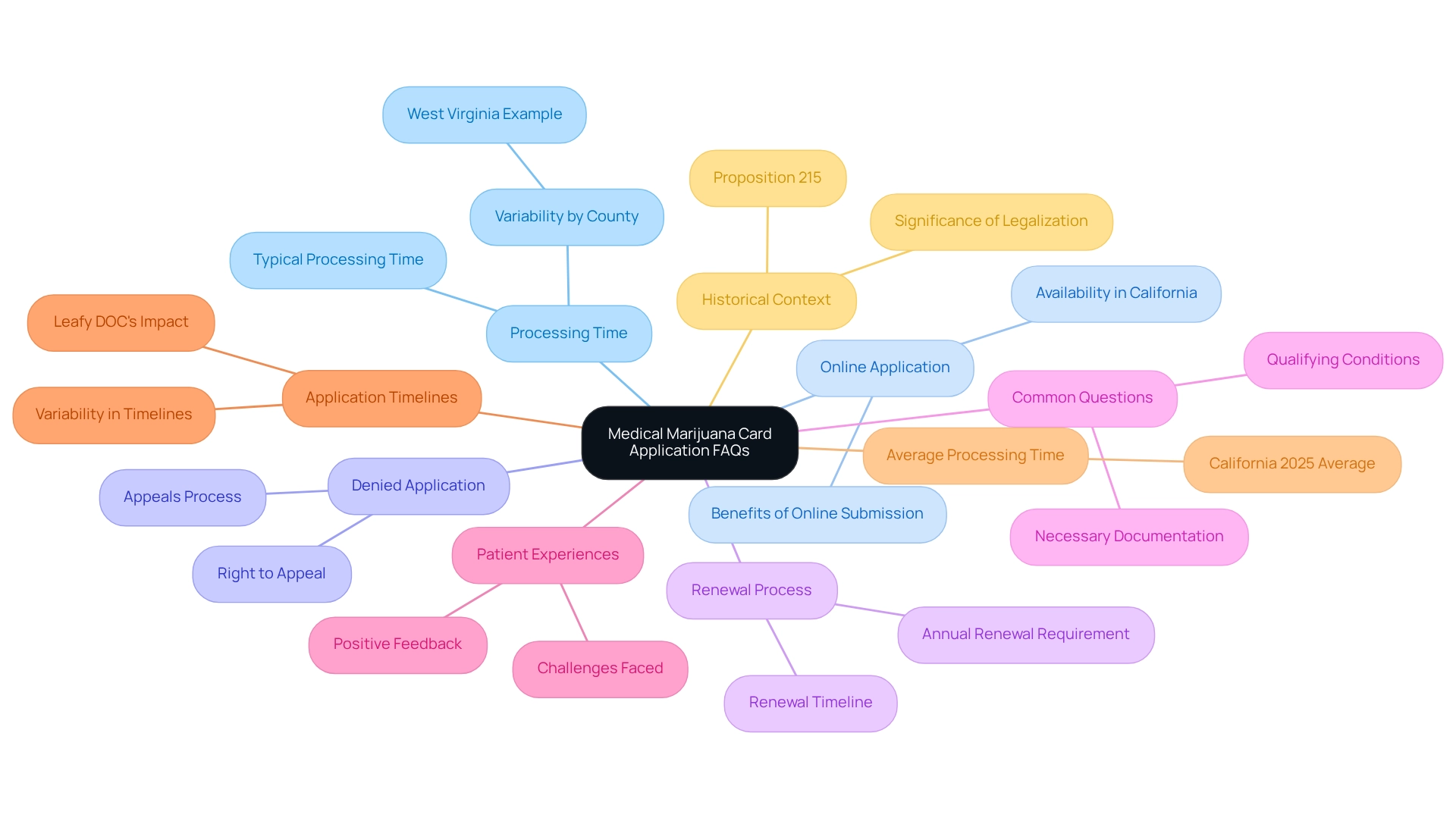
Benefits of Obtaining a Medical Marijuana Card
Obtaining a medical marijuana card in California can significantly enhance the quality of life for patients, especially those grappling with chronic pain, mood disorders, and other debilitating conditions. It’s important to recognize the struggles many face, and the benefits of this card can be truly transformative.
-
Legal Protection: Cardholders enjoy legal protection to possess and use cannabis for medical purposes, which alleviates the anxiety of potential legal complications. This assurance allows individuals to focus on their well-being, particularly crucial for those managing chronic pain or mental health challenges.
-
Access to Quality Products: Medical marijuana users typically have access to a wider selection of superior and more potent products compared to recreational consumers. This access is vital for individuals seeking effective treatment tailored to their specific health needs, such as those with cancer or epilepsy, who may benefit from the anticonvulsant and mood-enhancing properties of marijuana.
-
Reduced Expenses: Many dispensaries offer discounts for patients, and cardholders may be exempt from certain taxes. This can lead to significant cost savings, making therapeutic marijuana more accessible. For instance, in California, medical cannabis patients can save considerably compared to recreational users, who face higher taxes and fees. This financial relief is essential for those relying on marijuana for chronic pain management or other ongoing health issues.
-
Higher Possession Limits: Medical cardholders are allowed to possess larger amounts of cannabis than recreational users. This increased limit ensures that individuals have enough supply to manage their conditions effectively, reducing the need for frequent dispensary visits, which can be challenging for those with mobility issues or chronic pain.
-
Cultivation Rights: Patients with a medical card may have the right to grow their own plants. This not only grants greater control over their medication but also enables them to cultivate strains that best meet their therapeutic needs, improving their ability to manage symptoms effectively.
-
Quick Processing Times: Many applications for marijuana cards are processed within 24-48 hours, allowing individuals to quickly access the benefits of therapeutic cannabis. This rapid access is crucial for those in need of immediate relief from chronic pain or other debilitating symptoms.
Real-world examples highlight these benefits. For instance, a recent study titled “Impact of Cannabis Treatment on Suicidal Ideation” found that individuals using cannabis experienced a significant reduction in suicidal thoughts and improved mood after three months of treatment. Such findings underscore the therapeutic benefits of medicinal marijuana, particularly for those with psychiatric disorders, including veterans with PTSD who have reported fewer symptoms and an enhanced quality of life.
Moreover, a study published in Clinical Therapeutics revealed that 91% of military veterans who pursued therapeutic marijuana reported improvements in their quality of life. This emphasizes the profound impact that lawful access to high-quality products can have on individuals’ well-being.
In summary, understanding how to obtain a medical marijuana card in California reveals diverse benefits, including legal protections, financial savings, and improved access to effective treatments. As the marijuana sector continues to evolve, these advantages are expected to grow, further supporting individuals on their health journeys. Additionally, the belief in equal access to industry opportunities highlights the broader social implications of healthcare access, reinforcing the importance of these benefits for all patients.
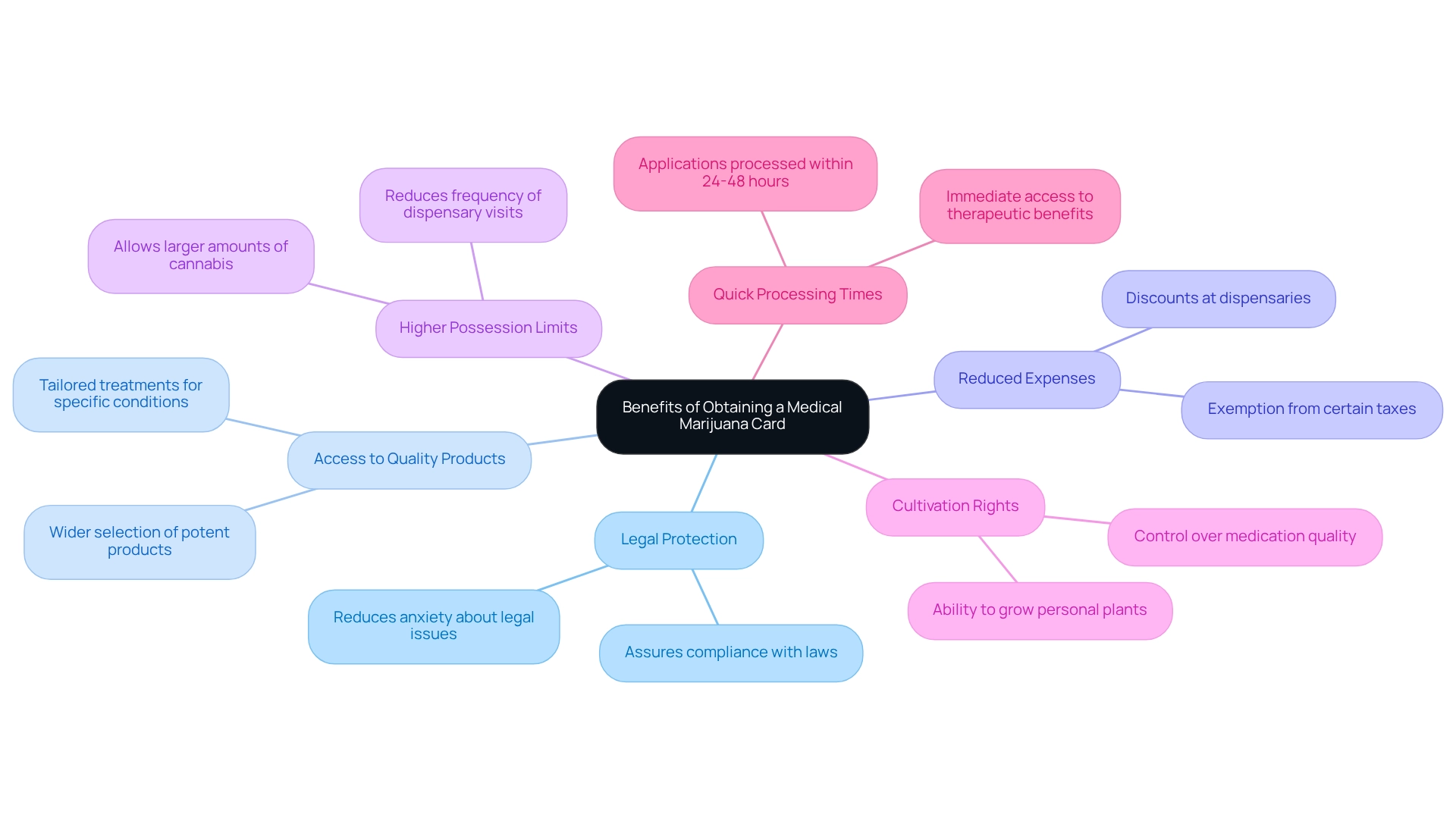
Legal Considerations for Medical Marijuana Card Holders
Navigating the complexities of medical cannabis laws in California can be challenging for cardholders. It’s essential to understand several important legal considerations to ensure compliance and protect your rights.
Possession Limits: As a patient, you are allowed to possess up to 8 ounces of dried herb or its equivalent in other forms. Exceeding these limits could lead to legal consequences, making it crucial to grasp and adhere to state regulations.
Use in Public: While therapeutic cannabis use is permitted, consuming it in public areas is generally prohibited. It’s advisable to enjoy marijuana in private settings to avoid potential legal issues. Additionally, using cannabis within 1,000 feet of schools, childcare facilities, or youth centers while children are present is not allowed.
Employment Rights: Understanding your rights as a medicinal cardholder is vital. Possessing a medical card does not automatically shield you from workplace drug screenings or disciplinary actions. Employers may have specific policies regarding marijuana use, and being aware of these can help you navigate your rights and responsibilities at work. Many workplaces maintain drug-free policies that may not consider the legal status of therapeutic marijuana. If you’re visiting California from another state, rest assured that California recognizes therapeutic marijuana cards from other states, but be sure to check local laws to ensure compliance during your stay.
In light of changing legal frameworks, a recent study from 2024 revealed that individuals with psychiatric conditions who were prescribed marijuana experienced significant reductions in suicidal thoughts and depressive symptoms. This finding underscores the therapeutic potential of cannabis, particularly for those dealing with chronic pain seeking relief. However, the legal landscape continues to be complex, especially regarding workplace policies.
For instance, many employers in California enforce strict drug testing procedures that can impact therapeutic herb users. Healthcare organizations also face challenges in developing policies for therapeutic use due to inconsistent state and federal regulations, cultural biases, and safety concerns related to cannabis possession in healthcare settings. This situation calls for careful evaluation and policy development to balance patient rights and safety while complying with legal requirements. As law professor Julie A. Werner-Simon points out, the ongoing assessment of cannabis’s classification under federal law highlights the complexities surrounding its therapeutic use.
As legal factors evolve, staying informed about how to obtain a medical marijuana card in California is crucial for cardholders. Additionally, exploring career opportunities in the marijuana sector and learning about organic cultivation techniques can provide valuable insights for patients interested in the broader cannabis landscape.
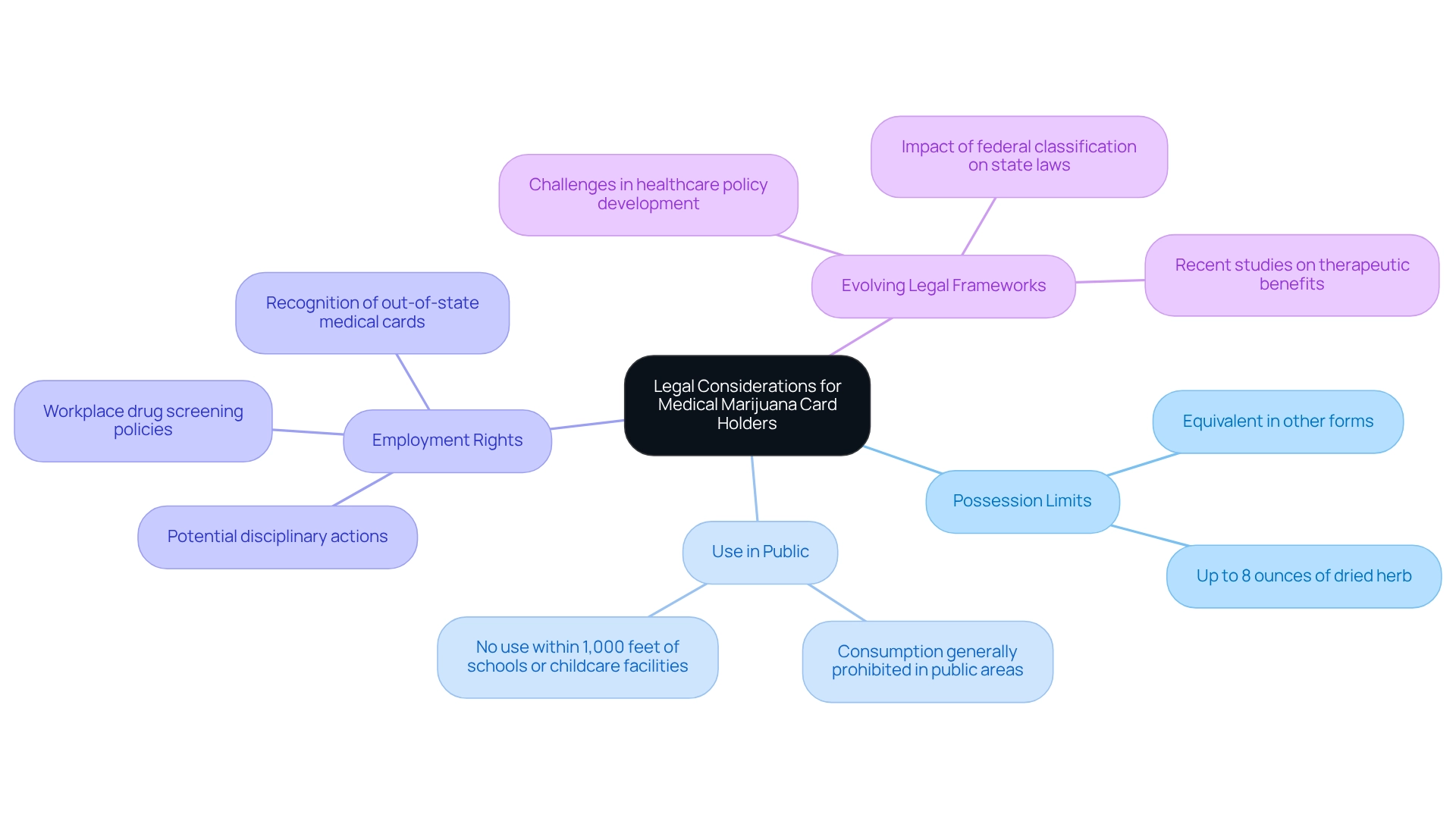
Renewing Your Medical Marijuana Card: What You Need to Know
Renewing your health-related card in California is a straightforward process that helps you maintain your lawful access to medical marijuana. Here are some essential steps to guide you through this journey:
-
Check Expiration Date: It’s important to keep an eye on your card’s expiration date. Renewing before it lapses ensures you avoid any interruptions in your legal status.
-
Schedule a New Evaluation: A consultation with a licensed physician is necessary for obtaining a new recommendation. This step verifies your ongoing need for cannabis and is crucial for understanding how to get a medical marijuana card in California.
-
Complete the Renewal Form: You’ll need to fill out the Medical Marijuana Identification Card Application/Renewal Form (CDPH 9042) again. This form is vital for processing your renewal.
-
Submit Required Documents: Make sure to provide proof of identity and residency, along with the physician’s recommendation. Ensuring all documents are current and accurate helps avoid delays.
-
Pay the Renewal Fee: The renewal fee is generally the same as the initial application fee, making it a predictable expense in your healthcare budget.
-
Obtain Your New Card: After processing, you will receive your renewed marijuana card, allowing you to continue accessing it legally.
In California, many individuals are informed about how to get a medical marijuana card, with numerous requests for card renewals often handled within 24-48 hours for a quick turnaround. As we look toward 2025, staying updated on any changes to renewal requirements is essential, as new regulations may emerge. For instance, recent legislative initiatives in New Mexico highlight the ongoing development of therapeutic marijuana laws, which could influence practices in California, particularly regarding individual rights and safeguards.
Real-life experiences underscore the importance of timely renewals. Patients have shared that navigating the renewal process can be seamless when they closely follow these steps. Professional guidance emphasizes the need for individuals to stay connected with their healthcare professionals during the renewal process, ensuring they receive the essential support and advice.
Moreover, a recent study published in Clinical Therapeutics revealed that 91% of military veterans who consult providers for therapeutic marijuana reported an enhancement in their quality of life. This underscores the benefits of maintaining access to therapeutic marijuana. Statistics indicate that renewal rates for marijuana cards in California remain high, reflecting the growing acceptance and use of therapeutic marijuana among individuals. By following these steps and staying informed about how to get a medical marijuana card in California, you can ensure that your access to therapeutic marijuana remains uninterrupted.
Leafy DOC is dedicated to simplifying this process through telehealth services, providing individuals with the necessary education and support to navigate their cannabis journey effectively.
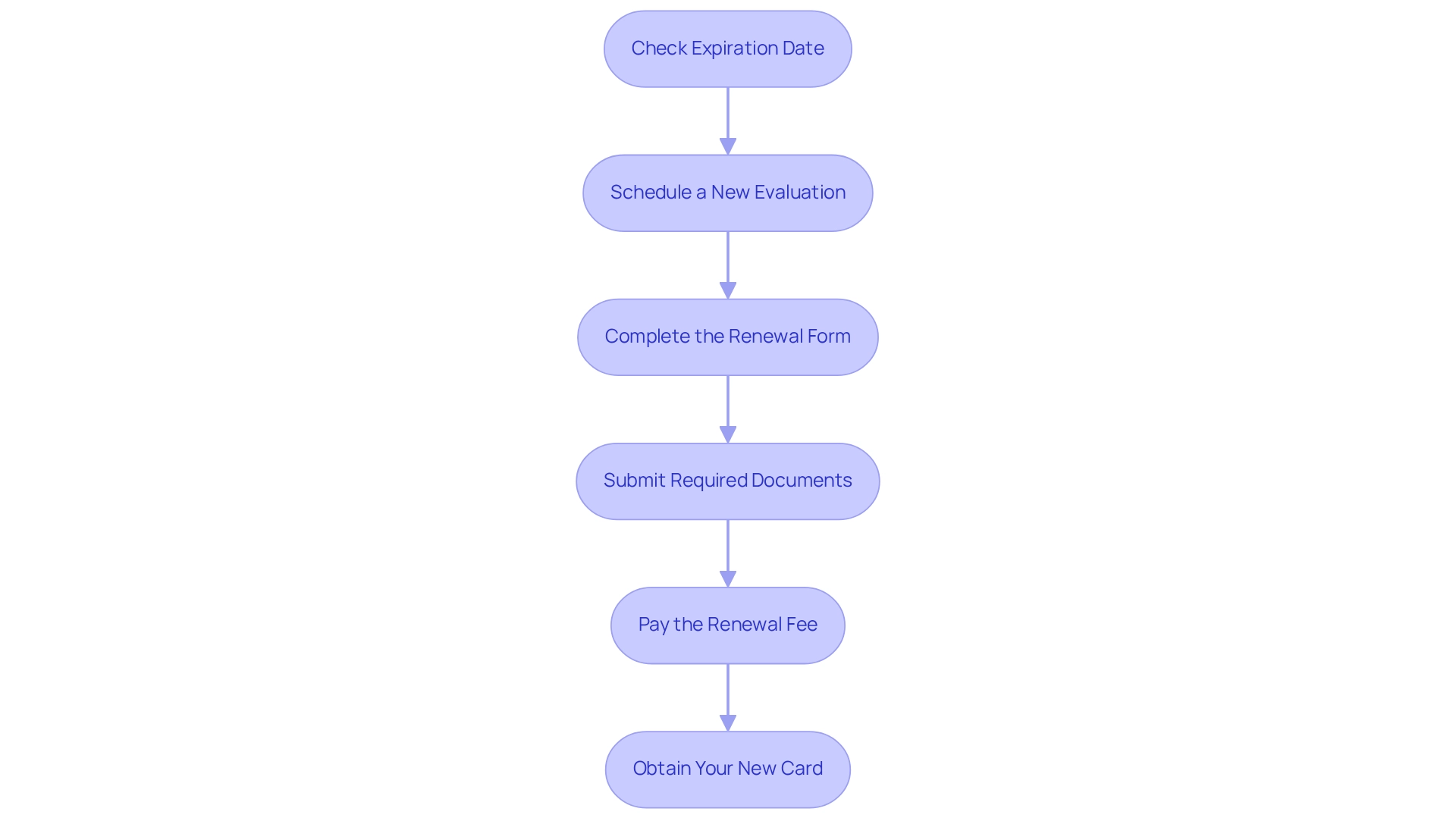
Resources and Support for Medical Marijuana Patients
Patients seeking to understand how to obtain a medical marijuana card in California may feel overwhelmed by the process. Fortunately, a variety of resources and support services are available to help ease this journey and enhance your overall experience:
- Telehealth Services: Platforms like Leafy DOC are transforming access to medical marijuana by providing online consultations with licensed physicians. This approach allows you to receive suggestions and certifications from the comfort of your home, eliminating the need for in-person appointments. With most applications processed within 24-48 hours, you can quickly access the medicinal cannabis you need.
It’s important to remember that Leafy DOC ensures that a clinical visit for your initial certificate can be conducted via telehealth, offering a synchronous face-to-face interaction with your certifying healthcare provider.
-
Expert Guidance: The certified health professionals at Leafy DOC are dedicated to assisting you throughout the application process. They offer personalized support tailored to your unique health needs, ensuring you understand your options and receive the appropriate advice for your situation.
-
Advocacy Groups for Individuals: Organizations like Americans for Safe Access play a crucial role in supporting therapeutic cannabis users. They provide education, advocacy, and resources to help you navigate the complexities of obtaining a cannabis card. These organizations often emphasize the importance of telehealth services in improving access to care, especially for individuals in underserved areas.
-
Local Health Departments: Your county health department is an essential resource, offering information on the application process, eligibility requirements, and local regulations related to cannabis use. Leafy DOC collaborates with these entities to ensure you receive accurate guidance and support throughout your application journey.
-
Online Communities: Engaging with online forums and support groups allows you to connect with others who share similar experiences. These platforms offer emotional support and practical advice, fostering a sense of community among therapeutic herb users.
-
Benefits of Having a Therapeutic Herb Card: Obtaining a therapeutic herb card comes with numerous benefits, including legal protection under state laws for the purchase, possession, and use of therapeutic substances. Cardholders also gain access to a wide array of high-quality, lab-tested cannabis products from licensed dispensaries, ensuring safe and effective treatment under professional supervision.
-
Case Studies: Numerous case studies showcase the effectiveness of telehealth services in improving access to therapeutic cannabis for individuals with various qualifying conditions. For instance, a recent case study illustrated how a patient in a rural area learned how to obtain a medical marijuana card in California through Leafy DOC’s telehealth services, significantly reducing the barriers they faced in accessing care.
By leveraging these resources, including the unique offerings of Leafy DOC, you can better understand how to obtain a medical marijuana card in California, ensuring you receive the support and care you need.
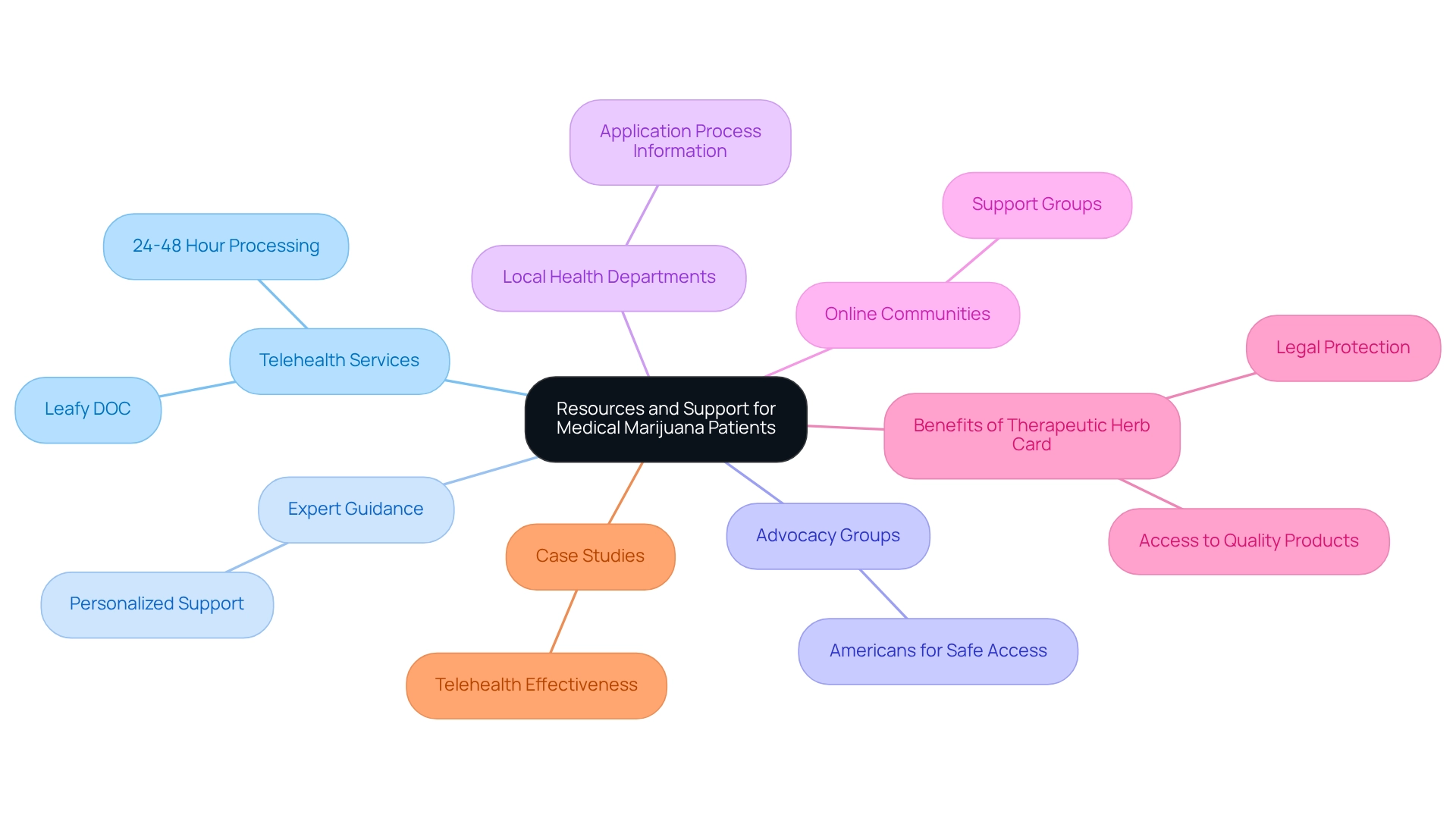
Conclusion
The journey to obtaining a Medical Marijuana Identification Card (MMIC) in California is not just a procedural step; it represents a meaningful opportunity to enhance the quality of life for many individuals facing chronic conditions. It’s essential to understand the eligibility requirements, the step-by-step application process, and the legal considerations involved, as this knowledge empowers those seeking the therapeutic benefits of medical cannabis.
The advantages of holding an MMIC are truly significant. They include:
- Legal protections
- Access to a wider range of high-quality products
- Financial savings
- The right to cultivate cannabis
These benefits are not just theoretical; numerous real-world examples and studies highlight the transformative effects that medical marijuana can have on patients’ lives, such as alleviating chronic pain and improving mental health.
As the medical cannabis landscape continues to evolve, staying informed about your rights and available resources is crucial. Organizations like Leafy DOC and patient advocacy groups are invaluable allies, guiding individuals through the application process. They ensure that you can navigate the complexities of accessing medical marijuana with confidence. By utilizing these resources, you can take proactive steps toward managing your health and well-being, knowing you are not alone in your journey. Remember, you deserve support and understanding as you seek to improve your quality of life.
Frequently Asked Questions
What is a medical marijuana card in California?
A medical marijuana card, also known as the Medical Marijuana Identification Card (MMIC), is formal proof that the holder has received a recommendation from a licensed physician, allowing them to purchase marijuana from dispensaries without the legal complications faced by recreational users.
What are the benefits of having a medical marijuana card?
The benefits include legal access to a wider variety of marijuana products, significant legal protections, and an enhanced quality of life for patients. Cardholders often report improved therapeutic outcomes and peace of mind knowing they are protected under California law.
Who qualifies for a medical marijuana card in California?
To qualify, individuals must be residents of California and present a qualifying health condition, such as chronic pain, anxiety, PTSD, or other serious ailments recognized by state law.
What steps are involved in obtaining a medical marijuana card?
Applicants must provide proof of identity and residency, secure a written recommendation from a licensed physician, and complete the registration process, which may vary by location. Upon approval, individuals receive a downloadable ID card via email or post.
What documentation is required to apply for a medical marijuana card?
Applicants typically need a government-issued ID and a utility bill or lease agreement to prove identity and residency, along with a written recommendation from a licensed physician.
How has the acceptance of medical marijuana changed in California?
As of 2025, California has approximately 1.1 million active MMIC holders, reflecting growing acceptance and reliance on marijuana as a treatment alternative for various health concerns.
What impact does therapeutic marijuana have on patients?
Therapeutic marijuana has been reported to provide significant relief for conditions like chronic pain and PTSD, allowing patients to manage their symptoms effectively while reducing reliance on conventional prescription medications.
How does the variability in state regulations affect access to medical marijuana?
Variations in state regulations regarding marijuana delivery can significantly impact patient access, emphasizing the importance of understanding eligibility requirements and local laws.
What trends have been observed in the issuance of cannabis permits in California?
A decrease in cannabis permits was noted from May to December 2023, followed by a rebound in January 2024, indicating an evolving landscape for therapeutic marijuana in the state.
How can online platforms assist patients in obtaining medical marijuana?
Platforms like Leafy DOC facilitate access to cannabis through telehealth services and educational resources, improving the quality of life for patients, especially those dealing with chronic pain, anxiety, and PTSD.
Last Updated: April 8, 2025
Get Your Medical Card
Connect with a licensed physician online in minutes

Like This Article?
Share with your friends
Table of Contents
Keep Reading

The Effects of Weed on Your Health
Weed, also known as marijuana, has been used for centuries for its medicinal properties. But what are the effects of weed on your health?

Boost Your Workout With Energizing Cannabis Strains
Elevate your workout game with energizing cannabis strains! Learn how these powerful strains can boost your fitness routine and help you reach your goals. Find the perfect strain for a high-energy session today!

A Guide To Vaporizers For Cannabis Consumption
Ready to elevate your cannabis experience? Learn all about vaporizers for cannabis consumption in this comprehensive guide. Find the best options and techniques for a smooth, effective high. Click here to start vaping like a pro!
